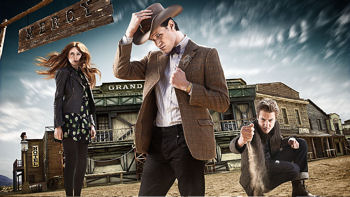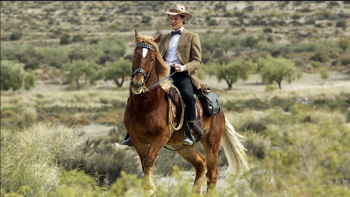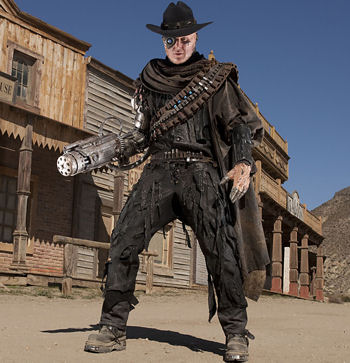The last time the TARDIS visited the Old West was in 1966's "The Gunfighters." I've never gotten around to watching that story, partly because it's historically been regarded as one of the worst of the series.
However, I can confidently say it's a better Doctor Who story than "A Town Called Mercy," if only because "Mercy" is not a Doctor Who story at all. It's a Star Trek episode, and not even a good one.
Some of the resemblances are superficial, though telling. We have a race of aliens indistinguishable from humans apart from tattoo-like markings on their faces (the one we spend the most time with is called "Jex"). We have a fearsome murderous cyborg with one circular mechanical eye and a gun built into its arm.
Other similarities are on a deeper level; for example, we have a plot where those aliens are fugitives and not quite what they appear to be, obligating our heroes to pass judgment on them from a position of supposed enlightenment, which breaks down into different characters attempting to embody different sides of a moral dilemma. And what isn't Star Trek seems inspired more by Firefly (the yee-haw setting, several of the characters).
 It's hard to find reasons why this should be a Doctor Who story, and that alone is a good reason to feel disappointed.
There are more reasons. For example, this episode is riddled with questions, this time distracting enough to take me out of the story. Who put up the town border and how did they know they'd need one? Why does the Doctor adore this alien race but know nothing about the circumstances of their war? Why does the cyborg seem to target based on clothing at first, and later on identifying marks? If he's seen his victim's clothing, why wouldn't he already know his face? How have the townspeople come to grasp the concept of aliens so quickly (are they all H.G. Wells fans? could they be, chronologically speaking)? How did Jex come to speak perfect English even before the TARDIS arrived? Some of these questions might seem pedantic, and perhaps none are inexplicable, but I didn't catch any of the answers even on the second viewing.
It's hard to find reasons why this should be a Doctor Who story, and that alone is a good reason to feel disappointed.
There are more reasons. For example, this episode is riddled with questions, this time distracting enough to take me out of the story. Who put up the town border and how did they know they'd need one? Why does the Doctor adore this alien race but know nothing about the circumstances of their war? Why does the cyborg seem to target based on clothing at first, and later on identifying marks? If he's seen his victim's clothing, why wouldn't he already know his face? How have the townspeople come to grasp the concept of aliens so quickly (are they all H.G. Wells fans? could they be, chronologically speaking)? How did Jex come to speak perfect English even before the TARDIS arrived? Some of these questions might seem pedantic, and perhaps none are inexplicable, but I didn't catch any of the answers even on the second viewing.
The biggest problem here is the only thing this story really has going for it: the moral dilemma. I appreciate the fact that this is a story about something; I'd asked for a big-pants theme last week, and it doesn't get much more grownup than questions about justice, forgiveness, repentance, revenge, and mercy. If only these had been dealt with in a sober and thoughtful way, this could have been a classic.
Instead we get a scene where the Doctor is goaded into rash action by a taunt he should have been able to answer.
 You can see what Whithouse was going for, but it seems sudden, unmotivated, something that comes out of the script rather than the Doctor's hearts. And then it's Amy who pulls him out of his rage (which unintentionally plays a little too comically) with a cliché ("we have to be better than them") and, worse, a Tennant retread ("you've been travelling alone too long"). It's one thing when Moffat plagiarizes himself, but when he and his writers start rerunning themes from just one Doctor ago, they seem frighteningly low on ideas.
You can see what Whithouse was going for, but it seems sudden, unmotivated, something that comes out of the script rather than the Doctor's hearts. And then it's Amy who pulls him out of his rage (which unintentionally plays a little too comically) with a cliché ("we have to be better than them") and, worse, a Tennant retread ("you've been travelling alone too long"). It's one thing when Moffat plagiarizes himself, but when he and his writers start rerunning themes from just one Doctor ago, they seem frighteningly low on ideas.
Even after that, the story could have been saved with Amy pinning on the Marshal's badge and becoming the moral center of the story. Instead the Doctor goes back to normal as if nothing's happened, because Rassilon forbid that the Doctor should step aside and let someone else be the hero for twenty minutes. (And if Amy's part in this is small, Rory's is barely noticeable, though both do get the funniest moments in this story, outclassing the material as they've come to do.)
So we have scenes of him cracking his neck like the big tough guy the character is not supposed to be, facing down the cyborg at high noon, strutting around in a Stetson, and coming up with a plan that puts everyone in town into mortal danger. Of course, we've already seen this danger spare the innocent, so when it does so a second time, there's not much drama to the moment.
 The performances here are competent, the accents bearable, the cinematography very good, the direction confusing and ill-advised. There are several points at which Jex does odd physical business that didn't seem motivated by anything; I wonder whether they're moments where scenes got cut that might have helped to flesh out the themes or the character motivations a bit better? The actor playing Jex either chooses or is directed to play some scenes as a beaming saint and others as a sneering villain, when what's required is to integrate these aspects into a single believable individual. A superlative performance there might also have saved the story, but I didn't see one.
The performances here are competent, the accents bearable, the cinematography very good, the direction confusing and ill-advised. There are several points at which Jex does odd physical business that didn't seem motivated by anything; I wonder whether they're moments where scenes got cut that might have helped to flesh out the themes or the character motivations a bit better? The actor playing Jex either chooses or is directed to play some scenes as a beaming saint and others as a sneering villain, when what's required is to integrate these aspects into a single believable individual. A superlative performance there might also have saved the story, but I didn't see one.
Even after all these disappointments, this story still manages to kick dirt onto its own coffin via the sort of convenient third-act voluntary suicide Whithouse has used in his last three stories to clean up the threat. Here, not only is it cheap and unpleasant, but it also manages to render incoherent any remaining shred of a meaningful theme that might be left.
It seems traditional in the Moffat era for the weakest story to be aired third in the season, and while it's too early to tell if this season will follow suit, we have in "A Town Called Mercy" a strong contender.

 It's hard to find reasons why this should be a Doctor Who story, and that alone is a good reason to feel disappointed.
There are more reasons. For example, this episode is riddled with questions, this time distracting enough to take me out of the story. Who put up the town border and how did they know they'd need one? Why does the Doctor adore this alien race but know nothing about the circumstances of their war? Why does the cyborg seem to target based on clothing at first, and later on identifying marks? If he's seen his victim's clothing, why wouldn't he already know his face? How have the townspeople come to grasp the concept of aliens so quickly (are they all H.G. Wells fans? could they be, chronologically speaking)? How did Jex come to speak perfect English even before the TARDIS arrived? Some of these questions might seem pedantic, and perhaps none are inexplicable, but I didn't catch any of the answers even on the second viewing.
It's hard to find reasons why this should be a Doctor Who story, and that alone is a good reason to feel disappointed.
There are more reasons. For example, this episode is riddled with questions, this time distracting enough to take me out of the story. Who put up the town border and how did they know they'd need one? Why does the Doctor adore this alien race but know nothing about the circumstances of their war? Why does the cyborg seem to target based on clothing at first, and later on identifying marks? If he's seen his victim's clothing, why wouldn't he already know his face? How have the townspeople come to grasp the concept of aliens so quickly (are they all H.G. Wells fans? could they be, chronologically speaking)? How did Jex come to speak perfect English even before the TARDIS arrived? Some of these questions might seem pedantic, and perhaps none are inexplicable, but I didn't catch any of the answers even on the second viewing.
 You can see what Whithouse was going for, but it seems sudden, unmotivated, something that comes out of the script rather than the Doctor's hearts. And then it's Amy who pulls him out of his rage (which unintentionally plays a little too comically) with a cliché ("we have to be better than them") and, worse, a Tennant retread ("you've been travelling alone too long"). It's one thing when Moffat plagiarizes himself, but when he and his writers start rerunning themes from just one Doctor ago, they seem frighteningly low on ideas.
You can see what Whithouse was going for, but it seems sudden, unmotivated, something that comes out of the script rather than the Doctor's hearts. And then it's Amy who pulls him out of his rage (which unintentionally plays a little too comically) with a cliché ("we have to be better than them") and, worse, a Tennant retread ("you've been travelling alone too long"). It's one thing when Moffat plagiarizes himself, but when he and his writers start rerunning themes from just one Doctor ago, they seem frighteningly low on ideas.
 The performances here are competent, the accents bearable, the cinematography very good, the direction confusing and ill-advised. There are several points at which Jex does odd physical business that didn't seem motivated by anything; I wonder whether they're moments where scenes got cut that might have helped to flesh out the themes or the character motivations a bit better? The actor playing Jex either chooses or is directed to play some scenes as a beaming saint and others as a sneering villain, when what's required is to integrate these aspects into a single believable individual. A superlative performance there might also have saved the story, but I didn't see one.
The performances here are competent, the accents bearable, the cinematography very good, the direction confusing and ill-advised. There are several points at which Jex does odd physical business that didn't seem motivated by anything; I wonder whether they're moments where scenes got cut that might have helped to flesh out the themes or the character motivations a bit better? The actor playing Jex either chooses or is directed to play some scenes as a beaming saint and others as a sneering villain, when what's required is to integrate these aspects into a single believable individual. A superlative performance there might also have saved the story, but I didn't see one.





